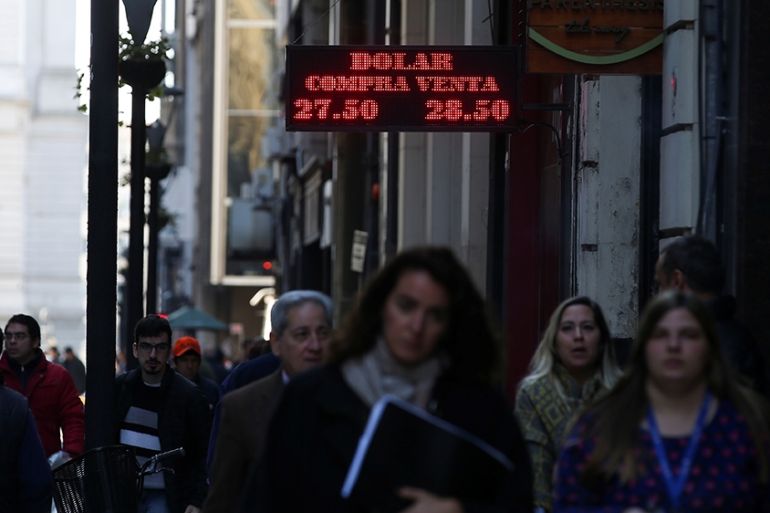To shore up peso, Argentina breaks IMF rule
Argentina’s IMF deal sets a $250m daily limit on foreign-reserve sales, but on Tuesday, the central bank sold $320m.

Argentina‘s central bank on Tuesday exceeded for the first time a guideline on reserve sales that was brokered as part of its $57bn standby agreement with the International Monetary Fund (IMF), violating the IMF guideline when it sold $302m in the foreign exchange market, traders said.
Argentina’s agreement with the IMF limits the central bank to $250m in reserve sales daily – a threshold that was set when the exchange rate was above 51.5 pesos per dollar, and that included the option to intervene further to “counteract episodes of excessive volatility”.
Keep reading
list of 4 itemsGazprom falls to first annual loss in 20 years as trade with Europe hit
Candidates confront corruption and inequality in Panama’s presidential race
What is behind the insulin shortage in the US?
The peso closed 1.76 percent weaker at 56.3 per dollar on Tuesday, traders said.
Argentina’s central bank has sold more than $1bn in its own reserves to support the currency against political uncertainty touched off by the left-wing opposition’s resounding victory in an August primary vote in the lead-up to the country’s October presidential election.
Other emerging market currencies fell against the dollar on Tuesday, as concern over the escalation of the China-US trade war drove traders away from riskier assets.
The Colombian peso fell over one percent, and Mexico‘s peso dropped 0.6 percent, while the Brazilian real was the only regional currency marginally up against the greenback.
Argentina’s peso lost 18 percent of its value in a week after leftist opposition presidential candidate Alberto Fernandez recorded a 15-point victory in the August 11 primary election, as investors reassessed the prospects of business-friendly President Mauricio Macri retaining power.
Fernandez has pledged to “rework” Argentina’s agreement with the IMF if elected, but has so far declined to share details of a plan.
Macri told an agricultural conference on Tuesday that inflation – which was running at a monthly rate of 2.2 percent in July – would tick up to slightly to over three percent.
“We were going to be at about 1.8 percent inflation. It’s now going to be three-something in August,” Macri said.
Argentina’s 12-month inflation is running at 54.4 percent, according to the national statistics agency. As of July, inflation had been decelerating for the fourth consecutive month after reaching a peak of 4.7 percent in March.
After meeting on Monday with IMF officials, who are visiting Argentina ahead of the next review of its lending programme, Fernandez’s leftist coalition issued a strident statement blaming the fund and Macri’s government for the crisis.
The visiting team from the IMF was expected to meet with central bank officials on Tuesday as part of its review of the standby agreement.
The IMF officials, who arrived in Argentina on Saturday, previously met with Treasury Minister Hernan Lacunza, central bank president Guido Sandleris, and presidential candidate Fernandez.
After the IMF’s meeting with Fernandez on Monday, his “Frente de Todos” (Front for All) coalition released a statement blasting the agreement.
“Those who have generated this crisis, the government, and the IMF have the responsibility of putting an end to and reversing it,” the statement said.
The IMF on Monday night confirmed the meeting with Fernandez and his team and said it was “a productive exchange of opinions”.